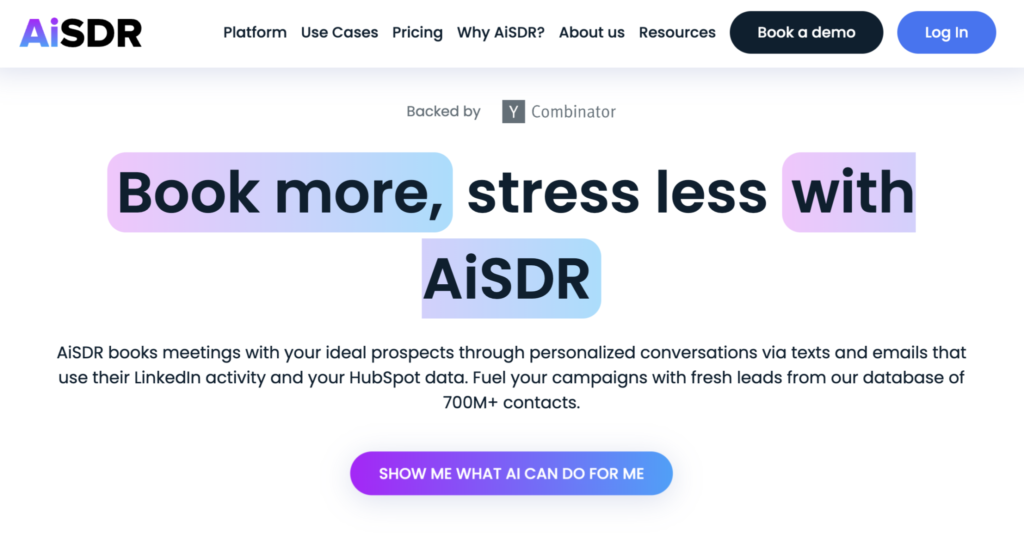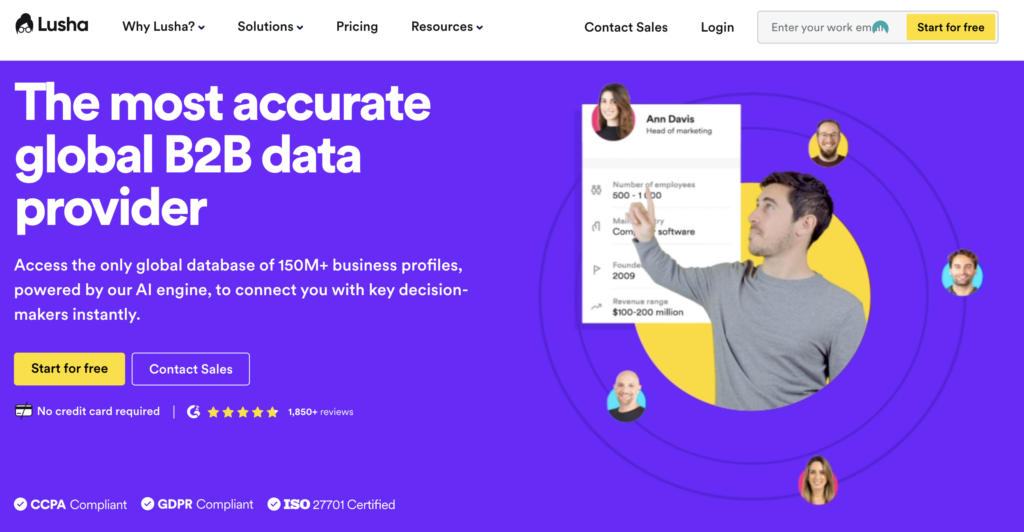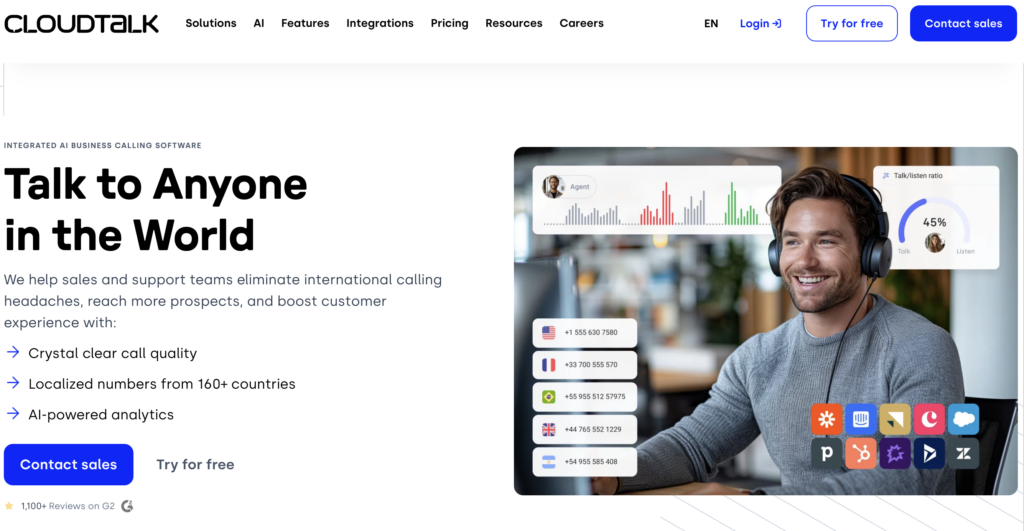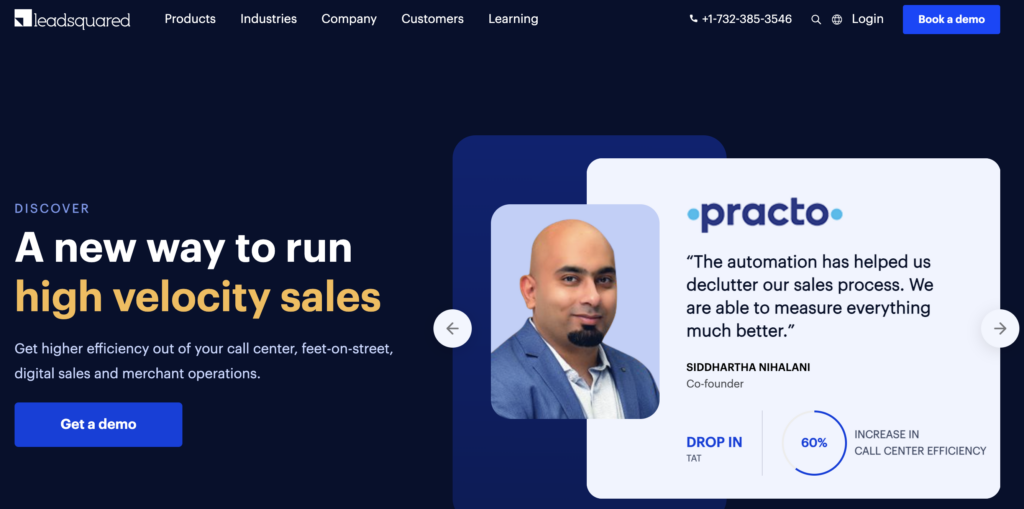AI for B2B Sales: How to Succeed When Everyone’s Using It

Not sure how to stand out with AI? Get tips and insights to get started
AI has become an essential tool for empowering B2B sales teams to work faster and smarter. But with so many companies already using AI in one way or another, it’s harder than ever to stand out. Businesses that want to succeed need to not only know how to use AI, but also how to use it to reach their strategic objectives.
How can AI support B2B sales pipelines?
The most competitive companies not just own data. They know how to extract actionable insights and use them for their purposes.
And that’s before you factor in AI. With AI in hand, savvy players can easily 2x or 3x the work they get done in the same amount of time.
Here’s a look at how AI powers different stages of the sales pipeline, from prospecting to post-purchase support.
Prospecting
While there’s a lot that AI can do, it won’t be capable of fully replacing human sales reps across all pipeline stages. But what it can do is allow reps to speed up sales cycles and free up time for actually selling.
When it comes to prospecting for new leads, AI excels at automating high-volume tasks: writing first-touch outreach messages, sending follow-ups, and personalizing content based on a variety of data sources:
Some AI sales reps will execute your prospecting on auto-pilot, while others need to be steered as a co-pilot. A few AI tools for AI B2B can run prospecting across multiple channels simultaneously like email and LinkedIn.
Lead qualification
AI can make the lead qualification process more effective by analyzing the list of leads in your CRM and identifying those most likely to convert based on their engagement history, behavior, and customer profile.
Demo or meeting scheduling
Sales representatives can use LLM tools to create meeting summaries and send personalized follow-up emails to prospects. Also, AI can monitor sales calls in real time, giving tips on wording, gestures, and tone of voice. Just imagine having your own sales assistant. Sounds cool, right?
Proposing and closing deals
AI can reduce the time spent creating proposals by generating personalized templates for various customer segments.
What’s more, with the help of predictive analytics, companies can forecast which proposals are more likely to succeed and strategically invest more effort into them.
AI-powered tools can analyze the client’s previous interactions with the company, its industry, competitors, and market conditions to predict how likely the client is to accept the proposal.

General benefits of AI for B2B sales
Beyond sales pipelines and sales funnels, there are a lot of spots where AI can give a helping hand.
Predicting future sales opportunities
AI-powered revenue and sales forecasting helps you take the guesswork out of your sales. For instance, AI may analyze your sales records and predict the number of deals within a certain period. Also, generative AI can predict individual customer needs and alert the seller when it’s the right time to contact the lead with the personalized offer.
Automating decision making
Setting priorities and allocating resources is a core skill of any sales representative. However, salespeople are often torn between all sorts of routine tasks and find it hard to focus on what yields the highest ROI.
AI can automate the decision-making process, provide data-driven insights, and notify you when it’s time to follow up with high-priority prospects or suggest cross-selling offers or discounts to prospects more likely to buy again.
Personalizing customer experiences
Equipped with detailed analytics, sellers can offer more personalized solutions to their prospects, saving time on manual research.
Every innovation brings its own set of challenges. Even though AI helps sales teams do their work faster, its implementation is often a road riddled with potholes. The good news is that the ride will be smoother if you prepare in advance.
Common problems your sales team may face
AI is not a magic wand or a cure-all for all sales process red flags. It’s a tool that comes with its own issues and limitations.
Here are a few ways your sales team might struggle with AI.
Quality of data for AI
AI needs a large amount of high-quality data for training. In B2B sales, valuable data sources include
- CRM data: Customer interactions, purchase history, lead status
- Marketing automation data: Email clicks, website visits, form submissions
- Sales call data: Transcriptions or recordings of sales calls and customer meetings
- External data: Industry trends, market data, and competitor analysis
To improve AI data quality, you’ll need to update your CRM data, analyze AI tools’ performance, improve the algorithm’s accuracy, and regularly source feedback from the sales team.
Lack of trust in AI
BCG research shows that regular users of GenAI are more optimistic about the technology than nonusers (62% vs. 36%). One of the reasons salespeople may not trust AI is the absence of a clear AI integration roadmap.
Sales leaders need to understand the most common AI use cases and how AI can help. They should also discuss all their team’s concerns about AI and ensure everyone stays on the same page.
Integration with existing systems
Make sure that AI tools easily integrate with your current infrastructure and cover all your needs. If there are gaps in integration, you may need to invest additional costs into manual information processing, affecting your ROI.
Privacy concerns
If you use pre-trained AI models like OpenAI, the training data you feed them is stored on the public server, so there’s always a risk of intellectual property leakage.
That’s why you need to confirm that your company’s prompts and internal data will not be shared publicly. Here’s what the AI software must provide:
- Encryption protocols
- User access controls
- Regular security audits
- Compliance with global data security standards (e.g. GDPR, CCPA)
Dependence on technological tools
Don’t let AI control all your business processes. Over-reliance on AI may lead to overlooking bottlenecks in your sales process. Worse still, your team may lose its critical skills, in particular, research, email writing, problem-solving, and information gathering. AI is the future of sales, but only in tandem with people.
To wrap up, AI integration isn’t a shortcut and requires a lot of groundwork.
Companies often expect AI to bring results instantly and hurry to integrate it without identifying real problems to solve. Let’s look at the potential risks.
Risks to avoid when integrating AI for B2B sales
When you just begin, it’s easy to fall into the AI hype trap.
Give yourself enough time to understand if you need AI and know how it will improve your work process. These are the most common risks to watch out for early on.
Seeking a problem for a solution
It might feel like everyone and their dog has already implemented AI, and you can’t resist doing the same. You quickly bookmark the article “10 ways to use AI in B2B sales” and rush to pitch your ideas to your boss.
But wait. Is there a real problem you’re trying to solve? Talk with your team, flag the processes that consume too much time, and decide if it’s worth automating them. Sometimes, automation may require even more resources than manual work, and the ROI may fall short of expectations.
Trying to automate everything at the same time
Another mistake sales reps often make is trying to automate everything at once. In this case, though, you risk spending a big portion of your budget on what may not bring the desired result. Start small and scale on the go.
Giving up too early
Sometimes, AI may not deliver what you expect from the first try. You may need plenty of testing to find the right GTM play that gets the results you need, so buckle up and experiment.
Best tactics and tips for positive AI implementation in B2B sales
Here are some tips you can put into action when implementing AI to outperform your competition.
Implement AI gradually
Always start small. You can begin by automating administrative tasks such as generating templates for sales pitches or updating CRM records. This way, you will build trust in AI, test the algorithm, and gather feedback from the team.
Then, you can move on to automating more complex tasks like gathering customer data or qualifying leads.
Run tests and analyze AI performance
AI is all about experimenting. Don’t be afraid to try various approaches and features until you find what works best for your needs.
If you use generative AI, tweak different prompts to see which one generates the expected result. It might take time at first, but your efforts will certainly pay off in the long run.
In addition, continuously monitor AI performance based on the KPIs:
- Lead conversion rate
- Length of sales cycle
- Forecast accuracy
- Time saved on repetitive tasks
Don’t make blind guesses. Always rely on your data to analyze the results of AI implementation.
Set clear, concrete goals
Develop an AI implementation plan with specific and measurable short-term and long-term goals. Include AI integration use cases, timelines, expected results, and success metrics.
Here are a few examples of clear goals:
- Increase lead qualification efficiency by 30% within 6 months
- Automate 50% of repetitive sales tasks (e.g., CRM data entry) by the end of Q2
- Reduce customer response time by 40% with AI chatbots within 3 months
Setting SMART goals will help you better measure the impact of AI and decide whether the game is worth the candle.
Train and empower your AI
Train your AI models using historical data to identify patterns. For example:
- Lead scoring – Feed the model historical data on leads that converted vs. those that did not, including factors like engagement, meeting notes, and industry type
- Sales forecasting – Provide previous sales data to help the AI recognize trends, seasonality, and sales performance in different periods
AI is not about set and forget. You need to train AI with new data regularly and track the quality of its performance.
Use feedback from sales reps on lead scoring quality or relevance of AI suggestions and regularly review conversion rates, deal closing speed, forecast accuracy, and other KPIs.
Useful B2B sales tools to make AI implementation more effective
Here are some of the top tools you can use to improve your B2B sales process and get more work done in less time.
AiSDR

AiSDR is an artificial intelligence platform that automates standard sales tasks such as prospecting, research, outreach, and lead qualification. AiSDR works great with human SDR, taking over email drafting, initial cold outreach, follow-ups, mailbox warm-ups, lead scoring, and other high-volume SDR tasks.
Lusha

Lusha is a sales intelligence platform that helps you perform better at each buying cycle stage. It seeks out decision-makers in your industry and provides access to their direct contact details, exporting them to your CRM. Also, you can install Lusha in your browser and reach your prospects right where you work. Lusha is CCPA- and GDPR-compliant, so rest assured that the highest privacy standards are met.
Cloudtalk

Cloudtalk is an AI call center software that helps sales and support teams reach prospects around the world and close more deals. It lets you call globally as a local and improve pick-up rates. Also, Cloudtalk AI analyzes your calls and unlocks powerful insights about their performance, such as talk/listen ratio, major customer concerns, objections, and buying triggers.
LeadSquared

LeadSquared is a sales automation platform that features lead scoring, sales workflows, real-time reports and dashboards, and automated workflows. With LeadSquared, you can also capture upsell/cross-sell signals and sketch sales process workflows for each opportunity type.
FAQ
How to use B2B AI tools for sales?
First of all, you need to articulate a clear goal. Then, analyze which tools might work best for your purposes. Here are a few specific scenarios:
- To automate your prospecting process by generating outreach messages and creating personalized templates
- To qualify leads and analyze their readiness to buy
- To create meeting summaries and send personalized follow-up emails to prospects
- To predict individual customer needs and give personalized offers
Will AI replace real salespeople?
AI works best in tandem with humans. AI doesn’t have emotional intelligence, which is crucial for building relationships with people. And sales is all about relationships and trust. AI can take over routine tasks, research, and analysis, letting sales reps focus on strategic priorities: building relationships and closing deals.
What are the benefits of using AI for B2B sales?
AI tools can automate manual tasks such as entering CRM data, creating emails, scheduling calls, and sending follow-ups.
AI also works great at providing data-driven insights into sales forecasting, lead scoring, and pipeline analysis. You can also use AI to analyze your outreach campaigns and create personalized pitches and sales scripts.
What challenges do sales departments often face when implementing AI for B2B sales?
One of the main challenges sales departments struggle with is the quality and amount of company data to train the algorithm. AI results will be less accurate if you do not have enough valuable data to feed the algorithm or if your data is unstructured.
Another issue is onboarding your sales team and creating a roadmap for AI integration. Everyone on your team should be aware of when and how to use AI in the sales funnel. Also, regularly source feedback from your team on how AI performs and address their concerns.











